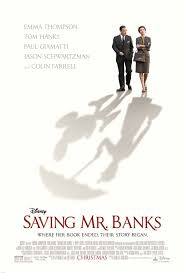
Saving Mr. Banks
directed by John Lee Hancock
starring Emma Thompson, Tom Hanks, Annie Rose Buckley, and Colin Farrell
Disney
Walt Disney (Hanks) is a pretty reasonable guy, he just wants to make the world happy and if he makes a million or two, so much the better. But P. L. Travers (Thompson) isn’t even interested in making herself happy; she’s dripping with daddy issues that date back to her earliest days as all daddy issues ultimately do. We flash back to Travers as a young girl named Ginty (Buckley) growing up in rural Australia. Her father Travers Goff (Farrell) was an alcoholic bank manager sent to his last posting in a town not only unpronounceable to the locals but at the very end of the rail line. Sheep stations and prospectors were his clients and alcohol was his mistress, yet he was amazingly supportive as a father – no drunken beatings, just a loving over-indulgence of her childish fantasies when he was too drunk to work. As he is nearing his last breath his sister-in-law Margaret (Wilson) arrives to settle things and nanny the children; she adds a much needed structure to their lives. From these mild beginnings flows great literature, Ginty’s painful memories became the delight of children and adults for years. Can Walt Disney resolve her internal failures and get her to grant his writing team the freedom to make an even greater film?
Of course he can, that’s the whole point. Hanks’ Walt Disney is all about magic – he oozes charisma that says “let’s get cracking.” He has a business side as well, but he always keeps the two balanced and appears as the magical and sympathetic uncle you never had. Travers (her pen name) has the most layers, there’s the wounded little girl, the bitter and alienated spinster, and the writer so protective of her work that she can’t begin to imagine it in the hands of other humans working in a radically different format. She objects to everything from Dick Van Dyke (she would prefer Olivier) to animated penguins (she doesn’t do sparkly) to the dreary sunshine of southern California (cold rain is morally superior). Supporting this not-quite-seduction is a brilliant set of characters. I loved the song writing duo of B. J. Novak and Jason Schwartzman as the Sherman Brothers – they sparkled and always had a musical solution to whatever road block Travers tossed them. Travers’ driver Ralph (Paul Giamatti) looked like a middle-aged boy, and he even played dolls with Travers in her lowest Page 75 moments. Last, but not least, is Dolly Paxson as Disney’s outside secretarial defense (he believed in layered defense, just like the US navy). She was as bubbly as a Dick Clark dance competitor while she brought out endless trays of Technicolor sticky snacks for the writers.
I really hate the terms “heartwarming” when describing movies, it implies a Sunday school type of happy ending, but that is really what is going on here. Therapeutically, the Disney team took Travers’ psychosis and alienation and turned it into a positive and acceptable model for all of our childhoods. Mary Poppins is still fresh today, its themes and motives are archetypical: parent/child alienation, discipline as transformative love, and a warm and fuzzy recall of tough times long since past. Dad may have been a drunk, mom may have been emotionally distant, and there was no money or food or friends, but we all reflect on those days as the best of our lives. Thanks, Walt, you nailed this one!












